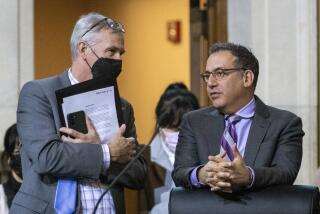Lawndale’s Manager May Be Next in City Hall Shake-Up
Lawndale City Council members have held two closed-door sessions on whether to fire City Manager Paul Philips and are expected to decide Nov. 24.
Philips’ 4 1/2-year administration has encountered serious problems recently, including a high-level report critical of the city Planning Department and the disclosure that the city lost more than $1.6 million in a speculative investment.
Top levels of Lawndale’s city management already have been shaken up in recent weeks. City Treasurer Ray Wood was fired on Oct. 1 as a result of the investment fiasco, and Planning Director Nancy Owens resigned about two weeks ago without giving a reason.
Declines Comment
According to sources who were privy to the closed sessions, the council members are less inclined to hold Philips responsible for the bad investments made by Wood than they are to fault him for the irregularities in the Planning Department. As city manager, Philips has overall responsibility for city functions, including planning and finance.
Philips declined to comment on the closed-door meetings or on the devastating report on the Planning Department prepared by City Atty. David J. Aleshire. The 45-page report, dated Oct. 1, was presented publicly to the council Nov. 5.
“I’m not in a position to comment,” said Philips, who has held the $60,000-a-year city manager’s job since Feb. 22, 1983.
The council’s principal criticism of Philips involves the Planning Department, according to sources who took part in a one-hour closed executive session last Thursday and a 3 1/2-hour private session on Monday. Such sessions are legal under the state’s open-government laws when city councils discuss potential litigation or personnel matters. Aleshire’s investigation turned up a number of errors that have resulted in the construction of buildings that do not comply with the city’s zoning law. The violations involve inadequate parking and non-compliance with laws governing subdivisions.
Permits Improperly Issued
“It appears that some building permits have been improperly issued by the Planning Department and that in some cases substantial construction has occurred pursuant to these permits,” Aleshire said in his report. He listed three projects--a retail center at 16711 Hawthorne Blvd., an office building at 17023 Hawthorne Blvd., and an 18-unit apartment at Jefferson and Rosecrans avenues--that received building permits but do not comply with zoning laws.
The permit for the office building was issued in error and revoked after the applicant had already received a bank loan, razed the existing building and performed some grading work. The revoking of a permit at that point could create “a potential for litigation,” Aleshire said.
Aleshire also found that some parking standards stated in the department’s handout materials for developers have no basis in city law.
In addition, he said, Lawndale’s zoning law “contains many vague and conflicting provisions which are inconsistent with present state law.” For example, the zoning law does not specify whether gross square footage or net square footage--the usable space--should be used to determine the number of required parking spaces in a project, he said.
Aleshire recommended that the city undertake “a full recodification” of the zoning law, which would mean analyzing and revising all the city’s zoning ordinances.
In the conclusion of his report, Aleshire delivered a blistering appraisal of the Planning Department:
“We do believe that the application of standards with no clear legal authority, or which appear to conflict with the proper legal authority, and the issuance of permits which allow development inconsistent with city ordinances is unacceptable, brings discredit to the city in both the development community and the community generally, and may subject the city to litigation.”
Owens, the planning director, who will officially leave her post Jan. 2 and is on sick leave from her $49,656-a-year job, could not be reached for comment. She has been planning director since Oct. 7, 1985.
City officials said some of the problems cited in Aleshire’s report occurred during Owens’ tenure, while others occurred before she joined the city staff.
The council is expected to make an announcement about Philips’ fate after the Nov. 24 meeting. A participant in the closed-door discussions said the council has respect for some of Philips’ accomplishments as city manager, and it may be reluctant to fire him because the action could harm the city’s case should damages be sought against the companies that handled the disastrous investment--E. F. Hutton & Co. and First Investment Securities.
If the council fires Philips as well as Woods, the source said, it could be construed as an admission of error by the city in purchasing U. S. Treasury bonds on margin. In a margin account, the investor puts down only a fraction of the price of the security, hoping the market will rise. If the market falls more than the amount invested, the entire investment is wiped out unless more funds are added. State law requires city council approval before such speculative investments are made, but the Lawndale council was not consulted and did not give its approval, city officials said.
Until a recent change made by the council in response to the huge investment loss, Philips held the title of city finance director. Now that title is held by the assistant city manager, a move designed to improve checks and balances and give an additional staff member an opportunity to review the city’s finances.
Wood, whose speculative investments resulted in losses totaling more than $9 million for five municipalities including Lawndale, has declined to comment except to say he regrets the losses.
More to Read
Sign up for Essential California
The most important California stories and recommendations in your inbox every morning.
You may occasionally receive promotional content from the Los Angeles Times.










